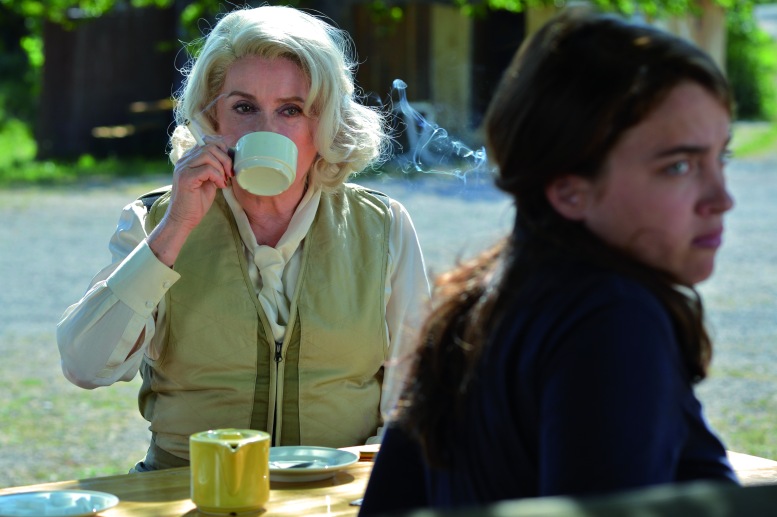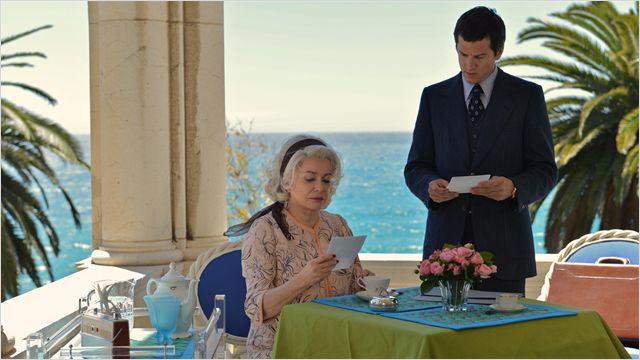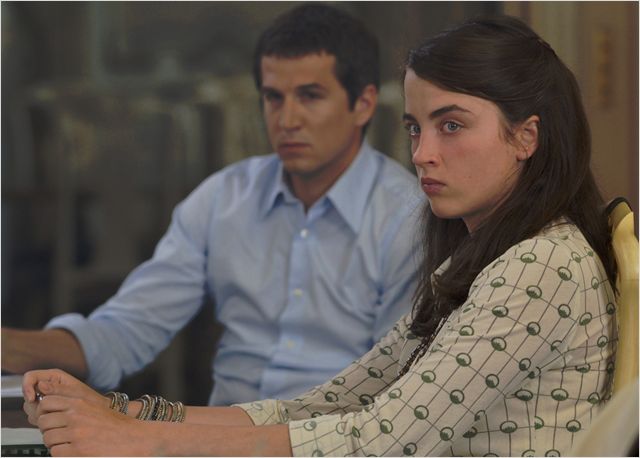
It is the strangest scene in an otherwise above average French crime thriller. Most of the film, which stars the queen of French cinema, Catherine Deneuve, is pretty good, and shows its director, the veteran André Téchiné, in fine form. You leave the theater with only two strong impressions: one, its last twenty minutes fell apart badly and could easily have been cut from the work. And two, that the very strange scene in the middle (it involves a young white women performing an African dance to a white man she is attracted to) needs some explanation.
The movie, by the way, is set in the seventies, on the French Riviera and, initially, concerns a glamorous widow, Renée Le Roux (Deneuve), who runs a casino and is a bit shady. Her enemies are gangsters. Her ally is a lawyer, Maurice (Guillaume Canet). Her daughter is Agnès (Adèle Haenel). Agnès has shares in the casino, loves to swim in any body of water that appears near her, and owns a small shop that sells books and African knickknacks. She falls in love with her mother’s lawyer, who turns out to be a womanizer and schemer. The downfall of both mother and daughter proves to be this lawyer. But that is another story. What concerns us here is the African dance Agnès does for Maurice in her apartment.

It happens like this. He visits her place with a gift—a notebook. She shows him some photos. One is of her in Africa. She is surrounded by very black and very poor children. She seems lost. The next photo is of her when she was a girl. She is captured performing a ballet move. Clearly, her childhood was unhappy—and for much of this movie, she is an unhappy adult. Except for this African dance scene, which happens right after the lawyer plays one of her cassette tapes. It’s a recording of the most unoriginal African drumming you could ever imagine. It is as bland as the taste of a stone in your mouth. It only says: This Is African Drumming. The lawyer asks Agnès to dance for him, and she agrees, if he promises not laugh. He will not laugh. He will only watch.
She then moves then her hands, then her arms, then her breasts, her hips, her ass, her head—nothing unusual here. But for reasons that cannot be attributed to the beat, which never varies, her dancing becomes more and more furious. And just before the scene is cut, she reaches the level of frenzy that Lisa Bonet attained with the bloody chicken in Angel Heart. The lawyer watches all of this with eyes that are not pleased or aroused (the movements are, after all rawly erotic), but instead that are coldly gathering important information. And what do they see? Here is a young woman who is clearly insane, clearly vulnerable, has lots of money and will be easy to trap. This is the function of the dance scene in the movie’s plot.

But why African? Why not disco dancing? It was popular at the time the film was set, the seventies, and would have had the same nutty effect. Furthermore, it is strange to see in a movie with almost no black people (there are two or so extras near the end), a white woman moving, gyrating, throwing her arms about like black Africans of old. Now, think for a moment if this film had been American, and the dance performed by, say, Twilight’s Kristen Stewart. Yes, it would have been controversial. Our own president might have even been obliged to weigh in on the matter. The Root would have registered it as an opportunity to stress that we are not living in a post-racial society. But in a French film, we can only watch and wonder what the hell are the French thinking? We know the country has a long colonial history with black Africa. But what to make of this? The UK, on the other hand, has reached the stage where this scene would be clearly read as comedy. But for the French it is dead serious. It is what it is.
One even suspects, because it is French, that black African professional dancers in Paris might have objected to this or that move (“totally phony!”), or seen a fatal error in the way she leapt (clearly East African and not West African, as the drumming style implies). This scene is buried in the French world, and the dynamics of its distinct racial and cultural history.
Charles Mudede is a Zimbabwean-born cultural critic and film editor for The Stranger. Mudede collaborated with the director Robinson Devor on two films, Police Beat and Zoo, both of which premiered at Sundance–Zoo was screened at Cannes.



